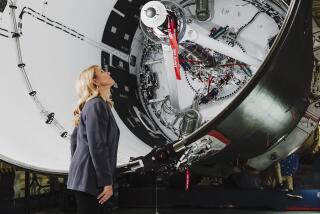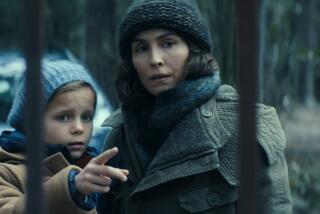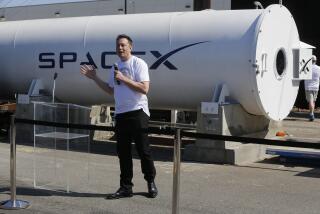June Scobee’s Heart Is in the Stars : Widow of Challenger Astronaut Promotes Space Education
- Share via
WASHINGTON — The night they met on a Texas hayride, June Kent, a pint-sized 16-year-old, and Dick Scobee, a strapping 19-year-old airman, fell in love.
“Dick and I were looking at the sky, looking at the stars,” said June Scobee, now a 44-year-old mother and grandmother, and widow of the commander of the ill-fated space shuttle Challenger.
Minutes of Nostalgia
Here from Texas to promote establishment of a memorial Challenger Center network of space technology schools, June Scobee became nostalgic for a few minutes. Her calm, whispery voice took on a cheerful quality as she recalled every detail of the night they met more than 27 years ago, the garden park where the hay truck took them, the lanterns flickering, the hot dogs and marshmallows roasting, the crisp fall air. Immersed in the recollection, June was with Dick Scobee again for a brief, blissful moment. The heavens--where he would one day vanish in a fiery instant--were once more a friendly, twinkling tapestry stretching before them, the way the future looks to teen-agers in love.
“We were drawn together,” she said, crossing two fingers to illustrate.
“The night was a beautiful October evening. I knew nothing about astronomy. I said something about ‘all those moons’ and he said, ‘No, they’re suns.’
“Talking about the stars led to (talking about) what his job was. I was fascinated with flight. I would go and watch airplanes at the airport. I had never even flown in an airplane before.
“He explained to me what kept the airplanes up. It (the aerodynamics of flight) is wonderful. “
They married less than a year later after a rather unusual courtship.
“We would go to an airport and sit and look at the airplanes and talk about airplanes,” Scobee said with a soft laugh. “He didn’t have much money, so our dates were strange.”
Years later, when Dick Scobee returned from a tour of duty in Vietnam with a Distinguished Flying Cross, one might have thought danger was behind him. But he was then selected to go to Edwards Air Force Base in Southern California to be a test pilot--one of the military’s most dangerous assignments. June Scobee did not exactly jump for joy.
“We talked about it for a year,” she said. “I said, ‘Don’t they sometimes become astronauts?’ And he said, ‘No. I couldn’t become an astronaut because I’m too tall.’ That was true then.
“He asked me if it was all right with me, and I thought about it. I realized for him not to do what he loves so much would be like a death situation. I realized he had to go forward with what he loved. . . . And I had to love him enough to let him do it.”
And she did. They lived at Edwards from 1970 to 1977. June got her master’s degree from Chapman College and both their careers seemed to be moving along routinely.
Then an unexpected thing happened. Space vehicles became larger, and the 6-foot height restriction, which Scobee had violated by an inch, was lifted. When he heard that NASA was recruiting astronauts, once again he proposed a dangerous idea to his wife.
Her reaction: “I was excited.”
Everyone copes with tragedy differently.
The widows of crew members Michael Smith and Ronald McNair took legal action after the presidential commission reported that NASA ignored repeated warnings that the O-rings in the solid rocket boosters could cause a Challenger type of tragedy. Jane Smith lashed out at the agency publicly, saying it made “incredibly terrible judgments” and showed “shockingly sparse concern for human life.” Soon after, she filed a $15-million wrongful death and personal injury claim against the government.
McNair’s family filed suit against Morton Thiokol, manufacturer of the solid rocket boosters blamed for the explosion. The amount of damages has not been proposed yet. McNair’s wife, Cheryl, said, “To do nothing would be a tacit acquiescence or stamp of approval of the type of conduct that took my husband’s life, and this I am unwilling to do and not required to do in America.” Smith’s and McNair’s claims are still pending. Bruce Jarvis, the father of crew member Gregory Jarvis, has said he is considering a suit as well.
According to McNair’s attorney, Ronald Krist, family members of other Challenger astronauts have contacted him and shown interest in suing.
“I would be stunned,” Krist said, “if most of them don’t file sooner or later.”
But June Scobee said she will not file. Not now. Not later.
She Will Not File
“I will not be filing a lawsuit,” she said, explaining that she would rather put her energy into the project that she was in Washington to talk about, establishing the Challenger Center network of space technology schools, to be headquartered here under the direction of the Smithsonian Institution.
It is possible that Scobee is better off financially than some of the other survivors, because of her husband’s high rank and civil service/retired military status. A NASA spokeswoman, Barbara Schwartz, said that she could not give exact figures, because of privacy regulations, but that under the formulas available, she could speculate that Scobee’s life insurance with the agency was “probably between $150,000 and $200,000” and his yearly pension, which June Scobee draws, is probably more than $30,000.
Benefits may differ widely among the late crew members. An attorney handling the affairs of one of the other survivors said that survivor’s monthly benefits add up to less than half the $30,000 pension NASA said Scobee probably receives. On the other side of the spectrum Christa McAuliffe, the schoolteacher on board, had received a $1-million life insurance policy as a gift before the flight.
Whether they need the money or not, many people who feel their loved ones were killed because of negligence file suits out of a sense of justice, to relieve their anger and punish the guilty party.
Is June Scobee angry about the reported carelessness and poor decision-making that led to her husband’s death?
“You can begin to control your feelings by conducting some kind of effort” that puts the “focus on the positive,” she said.
Shouldn’t these people be made to pay for their mistake?
“It says it all in the (commission) report. I think the country and NASA are both responding to the recommendations,” Scobee said.
A friend of Jane Smith’s said that Smith has received support for her decision to file a suit, with one exception.
Agree to Disagree
“The only person critical has been June,” the friend said. “She really has her mind set on the Challenger Center and she’s concerned that litigation will upset the apple cart. But they are friends. They have a strong bond. They just agree to disagree.”
June Scobee said she did not tell Jane Smith she disapproved of her decision to file a suit.
“I never said anything like that to her. It’s her choice,” Scobee said. “I love Jane Smith. I love every one of those family members. We are so close and we have such an outstanding support system. They’re the best thing for me, other than my own children.”
Scobee says she believes her husband would not have wanted her to file a suit. He would rather she continue “the mission,” she said, “the image, the goal of manned space flight.
“If words could bring my husband back, I would speak volumes. If money could bring my husband back, I’d sue for millions. What will provide some kind of living tribute to him is to carry on the goals and dreams.”
Discussing the kind of continuing public effort that would be necessary to raise funds for the center, the crew members’ families sometimes balked, wondering if they could stand talking about the tragedy over and over. Some wondered if it wouldn’t be better to try to continue their lives and move away from the Challenger accident, out of the spotlight.
But Scobee, taking an indefinite leave from her job as an education professor at the University of Houston at Clearlake, Tex., was determined that the memorial school become a reality.
“We’d get together,” Scobee said, “and one of us would say, ‘I’m not sure (if I want to do it.)’ Then another would say, ‘It’s for the crew. It’s for the crew.’ We kept supporting each other.” A family member of each crew member is participating as a founding director.
Although detailed plans for the school are far from final, fund raising has begun in earnest. Letters have gone out to big corporations matter-of-factly requesting a donation of $50,000. Rockwell was the first to say yes and hand the check over.
She Will Talk to Anyone
Advertisements have been run in many newspapers. Television spots and direct mail campaigns are planned. And of course June Scobee, chairman of the board, will talk to anyone about it, any time, anywhere. She will make her plea in Los Angeles in February, while receiving an award from the California Assn. for Gifted Children. Scobee has specialized in teaching education of the gifted.
“There has been so much focus on the explosion and the loss and the death that we want the country to know what these people were about,” Scobee said. “Some of the people on the crew had been working as long as eight years for just that flight. You have to do something to continue their goals, their vision, their mission.”
Scobee said the main center would be in Washington, with satellite centers in Houston and other cities. Right now Scobee envisions that children, students and teachers could come to the center, or view one of its cable broadcasts, to learn about the space sciences. Hands-on training at a simulated flight deck would be available at the center. There would be both resident programs and activities for daily visitors passing through the center.
Planning the center has made the grieving process easier for the families, Scobee said.
“When our children are heartbroken,” she said, “we say to them, ‘Remember what we’re doing? Make it something good for the country.’ ”
Contributions may be sent to the Challenger Center, P.O. Box 90077, Washington, D.C. 20090.
More to Read
Sign up for Essential California
The most important California stories and recommendations in your inbox every morning.
You may occasionally receive promotional content from the Los Angeles Times.













